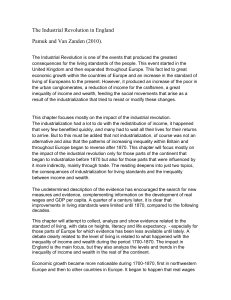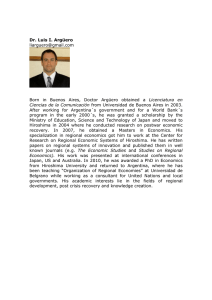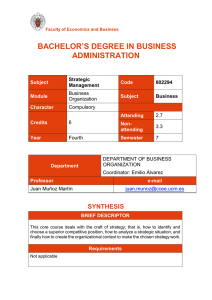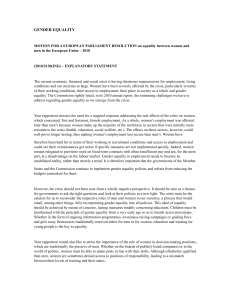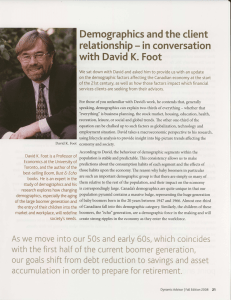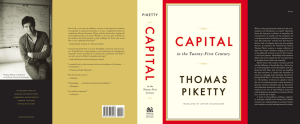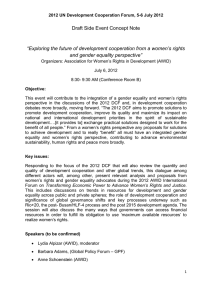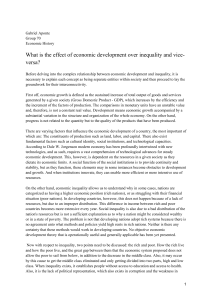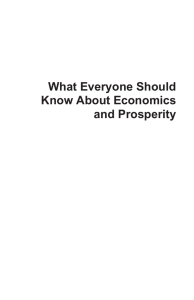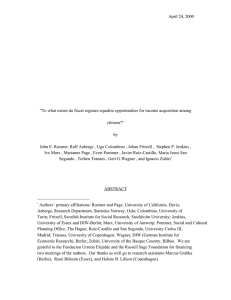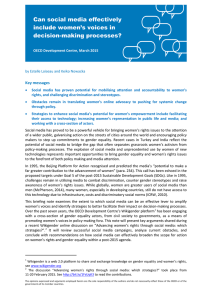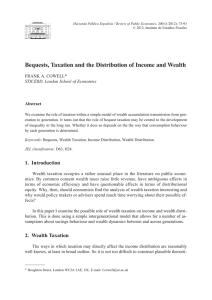Economic justice as a development strategy p gy
Anuncio
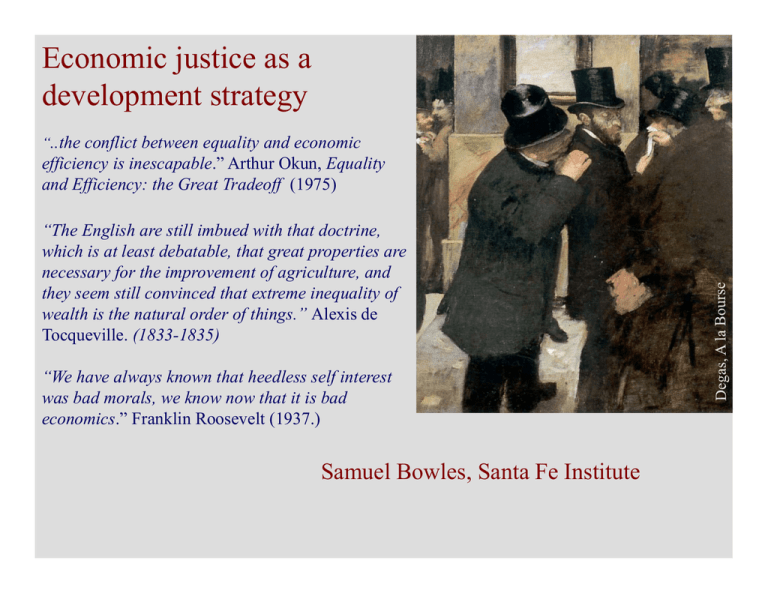
Economic justice as a p strategy gy development “..the conflict between equality and economic efficiency is inescapable.” Arthur Okun, Equality and Efficiency: the Great Tradeoff (1975) “The English are still imbued with that doctrine, which is at least debatable,, that ggreat pproperties p are necessary for the improvement of agriculture, and they seem still convinced that extreme inequality of wealth is the natural order of things.” Alexis de Tocqueville (1833-1835) Tocqueville. (1833 1835) “We have always known that heedless self interest was bad morals, we know now that it is bad economics.” Franklin Roosevelt (1937.) Samuel Bowles,, Santa Fe Institute Overview of the • Conventional wisdom: issues: The – I: wealth inequality is irrelevant for questions efficiency ffi i equality lit of efficiency (FT, Coase) trade off? – II: the efficiency equality tradeoff (EET) • E Empirical i i l studies t di (x ( country t & cases)) • Behavioral economics Efficiency b – Reciprocity, R i it inequality i lit aversion i & altruism lt i d • Contract theory a – W Wealth, lth signaling i li andd residual id l claimancy l i – Wages as an incentive (carrots and sticks) c Equality • The burden of inequality: guard labor and impediments to cooperation • Future: Equality & cooperation in the knowledge-based economy. Conventional wisdom (microeconomic theory version): the efficiency-neutrality of wealth inequality • Fundamental theorem of welfare economics: given complete contracts ((no “externalities”)) competitive p equilibria q are Pareto efficient irrespective of wealth endowments. • Coase theorem: if there are no impediments to bargaining, b i d allocations bagained ll ti will ill be b Pareto P t efficient ffi i t irrespective i ti off the assignment of property rights. Conventional wisdom (public policy version): the efficiency equality trade off. ) Efficiency b • K Key question: ti is i the th economy att a point i t like b or c? Or are we at a point like a d a c Equality Quiz: What will you find in every introductory textbook, but which could not be found in reality? Answer? Unicorns? • No, the answer is the efficiency equality tradeoff (some biology textbooks do not mention unicorns). • Early (1980s) warning: East Asian tigers and Latin American turtles • Econometric evidence Efficiency b • History d a c Equality Quiz: What will you find in every introductory textbook, but which could not be found in reality? Answer? Unicorns? In the rich countries, the golden age of trade unions and the welfare state was also the golden age of capitalism . Growth and Investment, 1820-1979 The new economics: the behavioral revolution (good bye to Homo economicus) . • An iconic experiment: the Ultimatum Game • Proposer makes offer • Responder accepts or not • If not both get zero • What would Homo economicus do? • Real people reject “unfair” offers • Hello to who? Homo what? The new economics: human behavior and the economics and politics of inequality and redistribution • The take home message: Many people hate injustice; enjoy contributing to more just outcomes, outcomes and are willing to pay a lot to punish those who are unjust. • New behavioral foundations for an economics of equality : – Inequality aversion – Reciprocity p y – Altruism – Self interest • .. And politics of redistribution The new economics of contracts: credit markets • Incomplete contracts in credit markets: the promise to repay is not enforceable if the borrower is bankrupt. • Results of incomplete contracts in credit markets – Those Th without ith t wealth lth are excluded l d d from f borrowing b i – Those with limited wealth borrow at higher costs and can finance onlyy smaller or superior p pprojects. j • Thus superior projects that would be undertaken by those with limited wealth are not financed while inferior projects of the wealth are fi financed. d • As a result policies that redistribute wealth may enhance the productivity of the economy, by improving the quality of the average projects that are financed. • Recognizing untitled wealth of the poor (e.g. de Soto) may backfire if credit di markets k are not competitive. ii The new economics of contracts: labor markets & production • Whyy did Henry y Ford double wages g and reduce hrs ((1914)? ) • Incomplete contracts in labor markets: the promise to work hard is not enforceable (because information on work effort is asymmetric: workers know it but employers p y do not). ) • Results of incomplete contracts in labor markets – Employers devote what otherwise would be productive resources ((supervision, p , surveillance equipment) q p ) to monitoringg workers. – The Nash equilibrium wages and effort are both too low. – Too much stick. Not enough carrot. • A work ethic and reciprocal motives can attenuate the problem, problem but not if wages are considered to be unfair. • Ownership of the firm by workers would reduce the monitoring problem (they have information on each other other’ss effort) but typically is unfeasible given workers’ exclusion from credit markets. The burden of inequality: Guard labor • Th The efforts ff off men are utilized ili d in i two different diff ways: they h are directed to the production or transformation of economic ggoods,, or else to the appropriation pp p off goods g produced by others. V.Pareto (1905). • it is lamentable to think how a great proportion of all efforts and talents in the world are employed in merely neutralizing one another. It is the proper end of government to reduce this wretched waste to the smallest possible amount, amount by taking such measures as shall cause the energies now spent by mankind in injuring one another, or in protecting themselves h l against i injury, i j to be b turnedd to the h legitimate l ii employment of the human faculties...J.S. Mill, Principles of Political Economy (1848) Guard labor: production of goods and services and reproduction of institutions and power relationships • Guard labor: labor devoted to the use of power to advance distributional claims and to perpetuate the economic institutions of a society. • Guard labor is unproductive in the classical sense (not that it is unnecessary; but it does not enter a production function for the goods making up final demand) Guard labor in the U.S. 1890-2002 How would Colombia look on a chart like this? Guard Labor: supervisory labor, private guards, police, judicial and prison employees, military and civilian employees of the department of defense (and those producing military equipment), the unemployed, and prisoners; all as percentages of the labor force Recapitulation (from the previous slides) • As a result ppolicies that redistribute wealth mayy enhance the productivity of the economy, by improving the quality of the average projects that are financed. • A work ethic and reciprocal p motives can attenuate the misaligned incentives of wage labor, but not if wages are considered to be unfair. • Ownership of the firm by producers would reduce the monitoring problem (they have information on each other’s effort) but typically is unfeasible given exclusion from credit markets of those with limited wealth. • But B even if wealth l h were redistibuted; di ib d producer-owners d would be reluctant to take risks unless they were protected from risks through more extensive social and economic insurance Egalitarian asset distribution as a development strategy • The logic: how we govern the economy is limited by wealth inequality, and greater equality wealth would allow superior governance structures. • Examples: policies to promote employee ownership of firms, productive borrowing by the less wealthy, high quality education for all, abolish or substantially limit intellectual property rights. The new economics of redistribtion Productivity enhancing asset redistribution: • Wh Where the h actions i taken k by b someone cannot be b subjected bj d to contract, property rights should assign residual claimancy over the income streams and asset values resultingg from the contested and non contractible aspect of the interaction to the person performing or providing that aspect. • The Th only l efficient ffi i t way this thi can be b done d is i by b assigning i i ownership hi to t the person providing the contested and non contractible aspect. • If this pperson is wealthyy the efficient assignment g of ownership p byy means of private exchange is unimpeded . • Otherwise the efficient assignment may require a redistribution of assets t by b means off a governmental t l intervention i t ti (e.g. ( land, l d residences, id capital goods). g will be pproductivity y enhancing g • Such a redistribution if well designed Productivity enhancing egalitarian asset redistribution: rationale and caveats • Assigns residual claimancy to those providing the non contractible aspect of exchanges (reduces the incomplete contract problem) • Facilitates F ilit t trust t t andd consensus on the th division di i i off the th gains i to t cooperation (remember the Ultimatum Game) • Reduces the demand for unproductive ‘guard labor’ • Caveats: – The real efficiency equality trade off: only the very rich are approximately risk neutral; redistributing assets to the less well off could reduce risk taking. – An expanded role for incentive compatible insurance to reduce the risk exposure of less wealthy owners, owners and hence encourage more risk taking A menu of policy paradigms, depending on the diagnosis and the distributional strategy Trickle down Trickle up S Supply l side id Washington W hi t consensus Demand side Investment- or export-led export led Keynesian models ProductivityP d ti it enhancing egalitarian asset redistribution Wage-led or social expenditure-led expenditure led Keynesian models A new economics of equality and redistribution for the weightless (knowledge-based) economy • Burden of inequality: substantial in the economy of grain and steel • It will increase in the weightless economy as the problem of incomplete contracts becomes more acute and hence the importance of cooperation (rather than fear and greed) increases. Less than a year ago I ended a talk at a conference of Latin American economics students with the following challenge: “Asset redistribution and cooperation in the knowledge based economy: I sounds It d good!.lets d! l do d it!! A free online Spanish p language g g edition of the New Economics ((but onlyy if you make it happen) Thanks to • The Behavioral Sciences Program of the Santa Fe Institute “Persistent inequality project” • The MacArthur Foundation research networks on “The costs of inequality” • Coauthors Pranab Bardhan Bardhan, Christina Fong, Herbert Gintis, Arjun Jayadev, Rajiv Sethi, Jung Kyoo Choi, Ugo Pagano Suresh Naidu, Pagano, Naidu Juan Camilo Cardenas and many more. • The team at U of Chile who have produced a free online version of “The New Economics..” (Oscar Landerretche, Daniel Hojman, j , Manuel Agosin g and a team of students) • Free online edition (thanks to Juan Camilo Cadenas of U de los Andes, and his cooperative team) http://bowlesmicroeconomia.unia ndes.edu.co/ Economic justice as a p strategy gy development “..the conflict between equality and economic efficiency is inescapable.” Arthur Okun, Equality and Efficiency: the Great Tradeoff (1975) “The English are still imbued with that doctrine, which is at least debatable,, that ggreat pproperties p are necessary for the improvement of agriculture, and they seem still convinced that extreme inequality of wealth is the natural order of things.” Alexis de Tocqueville (1833-1835) Tocqueville. (1833 1835) “We have always known that heedless self interest was bad morals, we know now that it is bad economics.” Franklin Roosevelt (1937.) Samuel Bowles,, Santa Fe Institute
